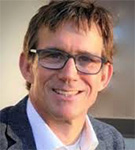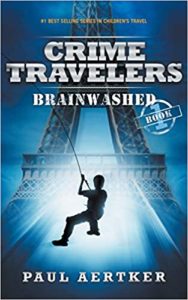Talking With Paul Aertker (Mauritania)

Paul Aetker
Paul Aertker (ETT Kerr) is a children’s book writer, teacher, and a frequent speaker at elementary and middle schools. He began his teaching career in West Africa with the Peace Corps where he helped establish the town’s first public library.
His first series, Crime Travelers, consistently ranks in the top spot in multiple Amazon categories. His newest book, Posthumous, has won the 2018 Foreword Reviews Indie Book of the Year Bronze Award, and the 2018 SCBWI Spark Award for “excellence in independent publishing for children.”
The Crime Travelers series has sold more than 25,000 copies per year for the last three years and has been optioned for TV/Film.
•
Paul, where are you from?
I grew up in Louisiana, surrounded by a kaleidoscope of African and Cajun cultures, and went to Millsaps College in Jackson, Mississippi.
Why did you decide to join the Peace Corps?
As cliché as it might seem, I wanted to see more of the world. Still do. I also wanted to teach others about how wonderful the US was and is, and I wanted to teach Americans how wonderful other parts of the world were and are.
What was your assignment?
I taught English in Zouérat, Mauritania, a small town located in the Sahara, south of Morocco. I also planted trees and worked at the Catholic Mission library.
After leaving the Peace Corps, what did you do?
I taught English and French and then later worked in school administration.
Was writing something that you always wanted to do?
No. I never thought I had what it took, and then the day after 9/11, I decided I needed to teach more kids about other parts of the world, and I started writing.
So you develop this series of novels that focuses on crime and children, and travel, right?
My first attempt focused on Africa and its problems and solutions, but my writing was didactic and boring. It was terrible. And it didn’t appeal to kids. I know it’s idealistic, but I wanted to prevent another 9/11, and I figured if people just knew about other people, other parts of the world, then it would be less likely for another 9/11 to happen. If we were friends with our enemies, we would have no more enemies. I think like a kid sometimes! But the next thought was that people not only do not know about other cultures, but they don’t even know basic geography. So that’s where I started. I believe it’s an Aristotelian philosophy about teaching where you take your students from a place of knowing to a place they do not know. It’s easier to learn if students understand the starting point. One of the things I learned teaching kids was that everyone seemed to know France, Paris, and specifically the Eiffel Tower. I figured I would start there and infuse the storyline with other parts of the world. I used Paris to teach world geography. Now, in all three books of the Crime Travelers series — Brainwashed, Diamonds Are for Never and Priceless — there are more than 300 geographic references. In the first book, Brainwashed, there is a Senegalese couple who help our hero out. The characters are an amalgamation of people I met in the Peace Corps. But the beauty of the setting of Paris allows for characters from other places to play a role. And it makes the story fun to write and fun to read!
What’s your most recent novel?
Posthumous, a middle-grade novel about a 12-year-old girl who wants to publish her late mother’s stories. In many ways, it’s an autobiography of my writing career—the rejections and triumphs. It’s also a tear-jerker. No kidding.
Besides writing, what do you do?
I am big into open water swimming. On the cerebral side, I study macroeconomic theory as a means of solving income and wealth disparity. But I haven’t figured out how to write a book about econ for kids!
Any RPCV writers that you have read and enjoyed?
I’m so glad you asked. I just read Ken Rutherford’s (Mauritania 1987-89) non-fiction novel about Civil War landmines America’s Buried History: Landmines in the Civil War. It’s a non-fiction page-turner.
•
Read the Peace Corps Worldwide review of Posthumous.
Thinking like a kid ain’t bad, in fact more of us should do so and goth dialogue and social]
relatiobs would no doubt greatly improve. Bill Donohoe (Ethiopia 62-64)